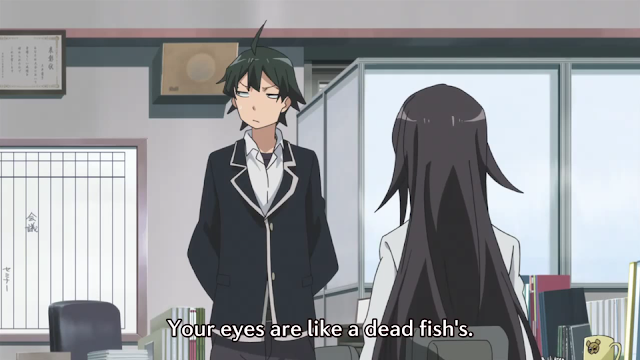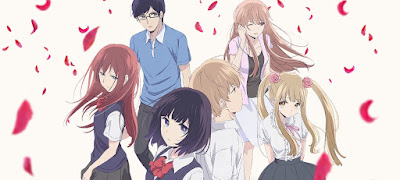Oregairu (2013) Review
Alternately known as My Youth Romantic Comedy Is Wrong As I Expected, Oregairu tells the story of Hikigaya Hachiman, an apathetic high school student with a nihilistic view on youth and life in general. Due to his unique personality and outlook on life, he spent most of his time as a loner, but make no mistake, he is not necessarily lonely. The series began when Hachiman’s teacher made him join the Volunteer Service Club as a punishment for writing an essay mocking social relationships. This introduced him to Yukinoshita Yukino, another outcast in the school. Together with another member, Yuigahama Yui, they solved problems brought forward by other students, but with Hachiman on the team, the methods are bound to be unconventional.
Now..... where do I even begin?
Oregairu is one of those anime I doubt I would have enjoyed as much when I was younger. I decided to give it a shot because it was suggested by one of my favourite anime Youtubers, Scamboli Reviews. I was right to trust him, because this show turned out to be not just hilarious, but also surprisingly mature.
The protagonist, Hachiman, climbed up my list real quick and became one of my favourite fictional characters of all time. His character alone managed to squeeze countless chuckles out of me, which is a great feat, since I usually just lift up one corner of my lips in response to anime humour.
Oregairu is cleverly-written; full of witty clap backs and self-deprecating jokes. The highlight of this series would be Hachiman’s monologues as he observes the social interactions around him. He has a radical take on youth, believing that people who enjoy their youth are deluding themselves. Hachiman stated that most people would consider betrayals and failures as something you experience at the height of your youth. However, he argued that this statement is contradictory because someone who fails to make friends is not considered to be living the peak of their youth. Hachiman concluded that society tends to go with whichever narrative is most convenient for them.
I would not consider him a pessimist, but rather, a realist so extreme that he becomes skeptical about everything around him. He has a ‘Me vs. The World’ mentality, believing that he is inherently different and that he would never fit in with The Crowd. Surprisingly, this worked so far, since Hachiman is rarely portrayed as sad, and has found a way to navigate the world his own.
“A lone warrior surviving hundreds of battles. When it comes to losing, I’m the strongest.”
(Note: If you’ve watched the series, you might notice that some of the supporting characters have first and last names which rhyme - Yukinoshita Yukino, Yuigahama Yui, Hayato Hayama, Kawasaki Saki. I like to believe that this was intentionally done to set Hachiman apart from the rest of the characters, solidifying his ‘Me vs. The World’ mindset.)
Since Hachiman spent so much of his time observing human interactions, he is quick to notice things such as tension in friendships. Ironically, when it comes to matters involving himself, he is practically clueless. Hachiman finds it difficult to believe that there are individuals who genuinely want to be friends with him; nothing more, nothing less. He tends to interpret kindness as an act of compulsion, pity or guilt. This mindset of his almost sabotaged his interpersonal relationships, except that he did not notice, since he’s unaware that others even considered him a friend in the first place.
As the series progresses, you will come to learn that Hachiman is the kind of person who is willing to paint himself as the villain if it means being able to solve a problem. He never sugarcoats his words, making him unpopular among most people at school. He does this because being blunt is the only way he knows how to live, and he is never the type to pat himself on the back for ‘being kind’. It’s almost painful for those who care about Hachiman to see him taking the blow repeatedly, and even more painful to see that he does not realize he is collateral damage. He’s so unapologetically himself, it makes us wonder if the rest of us are living our lives truthfully.
One particular part which many straight male audience seemed to relate to is Hachiman’s “I hate kind girls” monologue. Hachiman talked about how he learned his lesson when it comes to dealing with kind girls. When girls are kind to him, it makes him happy and he gets his hopes up, that is until he realizes that they are kind to everyone else too. This scene could have easily turned into a tasteless “nice guys finish last” rant, but it was fortunately pulled off well.
All I can say in response to those who share the same sentiment is this: Some people are kind because it is in their nature to be kind. Although it is right to not expect more out of that kindness, it is also important that you appreciate kindness as it is instead of dwelling on feeling “not special”.
Hachiman aside, the rest of the characters also have plenty to bring to the table. I especially loved the conversations between Yukino and Hachiman, if you can call an insult relay a conversation. Yukino also struggles with maintaining relationships, making them strangely compatible, though her set of problems are different. Hiratsuka-Sensei is funny and likable, and is always looking out for Hachiman. Her bitterness towards the fact that she's single in her 30's is definitely a facade, and that alone gives me an indication that we would get along well.
In conclusion, although I personally resonated little with Hachiman, it did not make this series any less enjoyable. Oregairu succeeds at being entertaining and emotionally mature, whilst delivering plenty of take-home messages. Despite his personality, is Hachiman at fault at all? Or does the fault lie with society, which collectively came together to behave in a homogeneous way by confining to the mould they created themselves?
"I like myself. I have never once hated myself. My high specs, my half-decent looks, my pessimistic, realist point of view... I don't hate any of it at all."
Oregairu managed to set itself apart from the sea of rom-com animes out there with its spot-on narration of social structures, all the while incorporating great comedy. I definitely say give this a try, and if it doesn’t work for you, revisit it when you’re slightly older.








Comments
Post a Comment